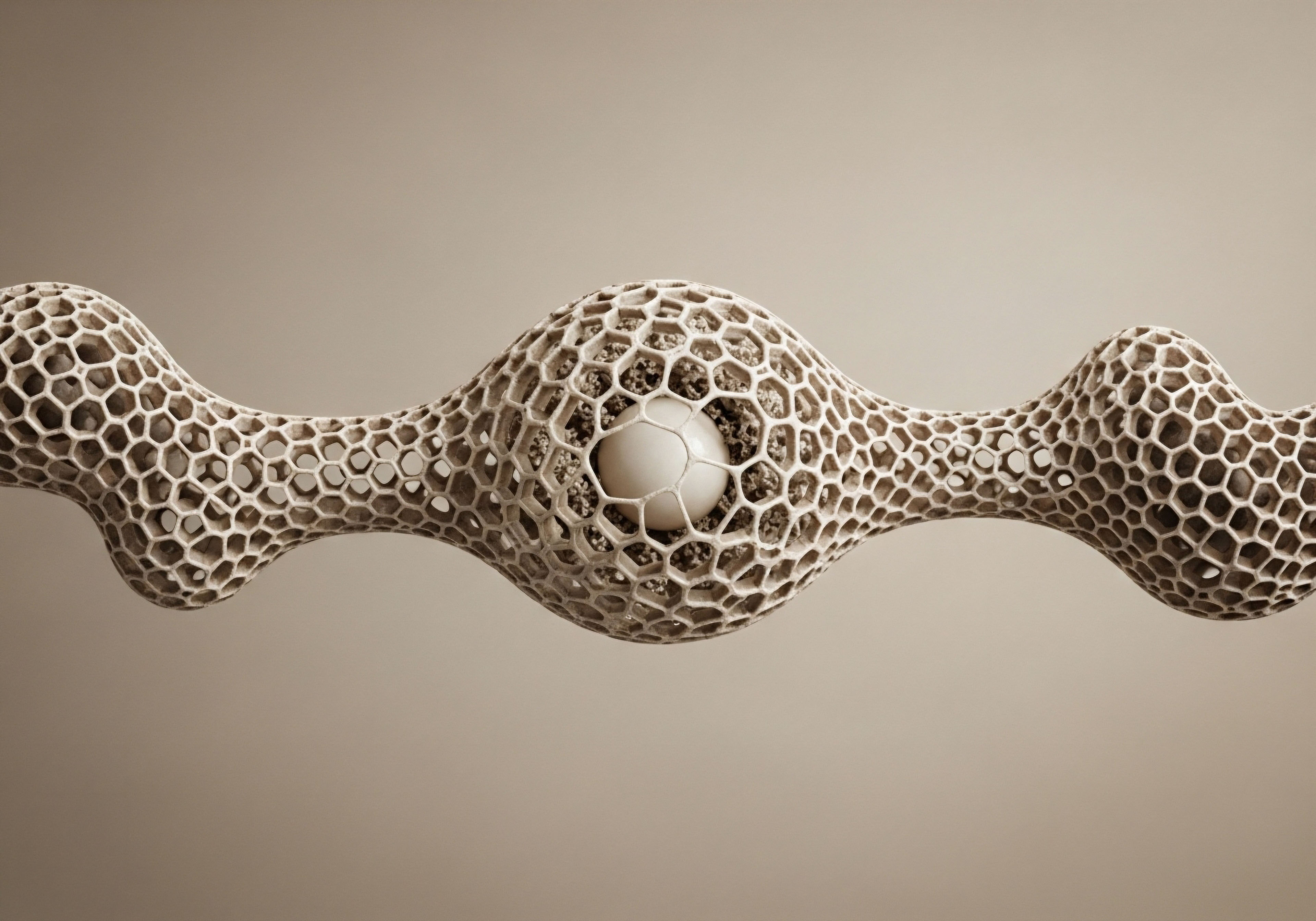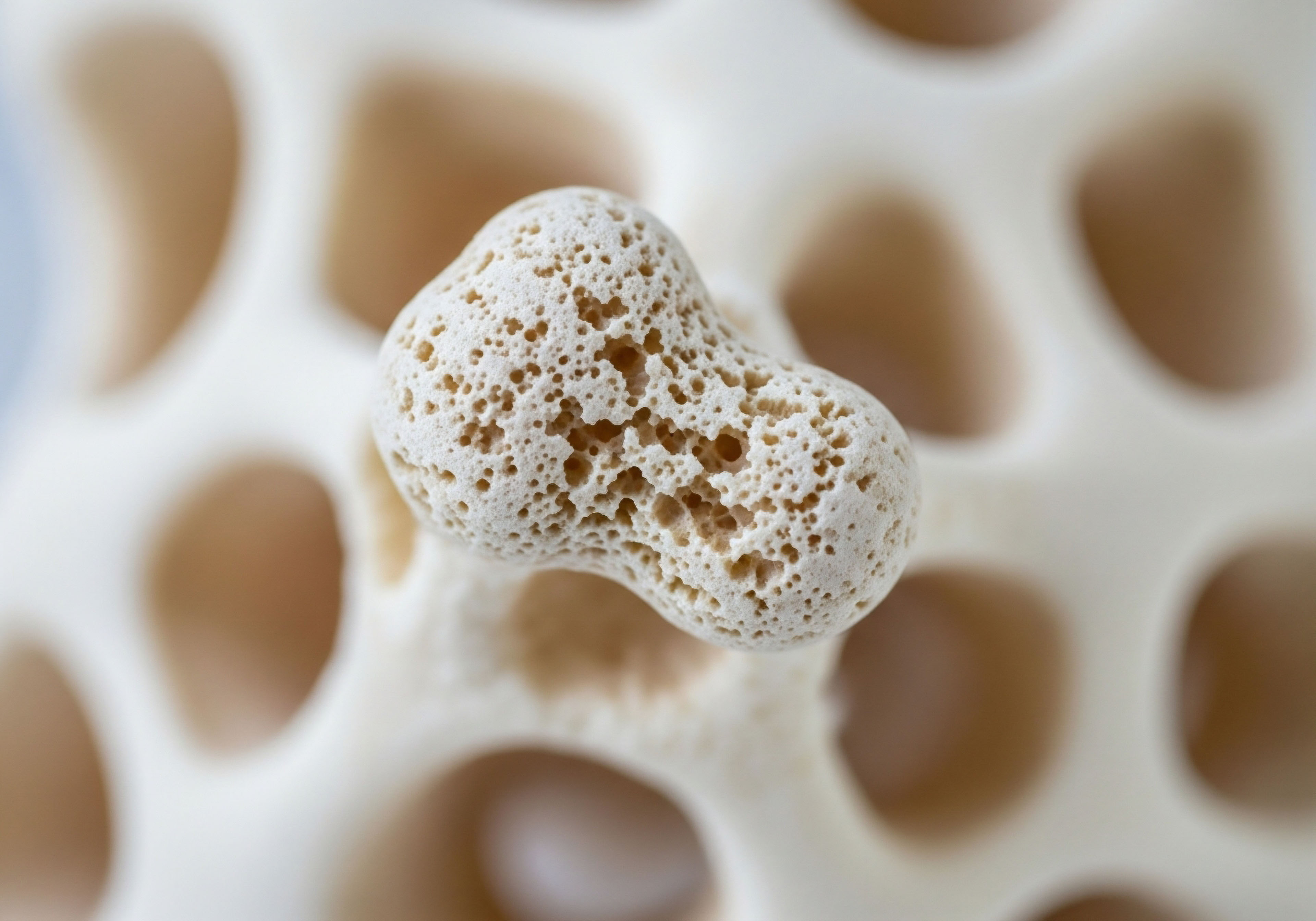

Fundamentals
Many individuals reach a point in life where the vibrancy once taken for granted begins to wane, replaced by a subtle yet persistent decline in energy, mental acuity, and physical resilience. This shift often coincides with alterations in the body’s intricate hormonal messaging system, particularly a decline in endogenous testosterone production.
The symptoms experienced, such as persistent fatigue, diminished motivation, or a gradual increase in adiposity, signal a systemic recalibration within the endocrine architecture. Understanding these internal shifts offers a powerful lens through which to reclaim one’s physiological potential.
When considering hormonal optimization protocols, particularly testosterone replacement therapy (TRT), a paramount consideration involves its long-term impact on cardiovascular health, especially when integrated with comprehensive lifestyle interventions. The cardiovascular system, a magnificent network of vessels and muscular pump, responds dynamically to the biochemical environment orchestrated by hormones. Optimized endocrine function supports the intricate balance required for robust cardiac performance and vascular integrity.
Understanding personal hormonal shifts provides a powerful avenue for reclaiming physiological potential and supporting cardiovascular health.

Understanding Hormonal Influence on Vitality
Testosterone, often perceived solely as a male hormone, plays a fundamental role in both men and women, influencing metabolic function, bone density, muscle mass, and even cognitive processes. A decline in its optimal range can manifest as a constellation of symptoms that erode an individual’s sense of well-being. Recognizing these indicators represents a critical initial step toward personalized health restoration.
The body’s endocrine system operates as a sophisticated symphony, where each hormone acts as a distinct instrument contributing to the overall physiological melody. Disruptions in this delicate orchestration can affect multiple systems concurrently, including the cardiovascular apparatus. Lifestyle factors, encompassing nutrition, physical activity, sleep quality, and stress management, directly influence this hormonal milieu.

What Is the Role of Lifestyle in Hormonal Balance?
Integrating thoughtful lifestyle choices with hormonal optimization protocols offers a synergistic effect. Dietary modifications, regular physical movement, adequate restorative sleep, and effective stress reduction strategies enhance the body’s intrinsic capacity to maintain hormonal equilibrium. This integrated approach can profoundly influence the metabolic and inflammatory pathways that directly bear upon cardiovascular outcomes.
- Nutrition ∞ A balanced dietary intake, rich in whole foods and micronutrients, provides the necessary building blocks for hormone synthesis and supports metabolic health.
- Movement ∞ Regular physical activity, a blend of resistance training and cardiovascular exercise, improves insulin sensitivity, reduces systemic inflammation, and maintains healthy body composition.
- Sleep ∞ Sufficient, high-quality sleep is indispensable for the pulsatile release of various hormones, including growth hormone and testosterone, facilitating cellular repair and metabolic regulation.


Intermediate
For individuals exploring hormonal optimization, understanding the precise mechanisms and the role of lifestyle integration becomes paramount for long-term cardiovascular well-being. Testosterone replacement therapy, when administered judiciously, aims to restore physiological testosterone levels, thereby mitigating symptoms associated with endocrine insufficiency. This therapeutic strategy, however, reaches its zenith of efficacy and safety when harmonized with a comprehensive lifestyle framework.
The cardiovascular system, a marvel of biological engineering, responds to the endocrine environment with remarkable sensitivity. Optimal testosterone levels contribute to favorable changes in body composition, including reduced visceral adiposity, which is a significant determinant of cardiometabolic risk. Furthermore, testosterone influences lipid profiles and glucose metabolism, both of which are central to cardiovascular health.
Judicious testosterone optimization, coupled with comprehensive lifestyle strategies, significantly enhances cardiovascular well-being.

Protocols for Testosterone Optimization
Standard protocols for male hormonal optimization frequently involve weekly intramuscular injections of Testosterone Cypionate. This approach provides a steady delivery of the hormone, aiming to maintain stable serum levels. Concurrently, adjunct medications such as Gonadorelin, administered subcutaneously, support the body’s intrinsic testosterone production and preserve fertility by stimulating the hypothalamic-pituitary-gonadal (HPG) axis. Anastrozole, an oral tablet, mitigates the conversion of testosterone to estrogen, preventing potential estrogen-related side effects.
For women, testosterone optimization protocols typically involve lower doses of Testosterone Cypionate via subcutaneous injection. The integration of progesterone therapy is often determined by menopausal status, supporting a balanced endocrine environment. Pellet therapy, offering a sustained release of testosterone, also represents a viable option, with Anastrozole utilized when appropriate to manage estrogenic effects.

How Does Lifestyle Integration Bolster Cardiovascular Health?
Lifestyle integration amplifies the benefits of endocrine system support, particularly concerning cardiovascular outcomes. Physical activity, for example, directly enhances endothelial function, promoting vascular elasticity and efficient blood flow. Nutritional strategies, such as a diet rich in omega-3 fatty acids and antioxidants, reduce systemic inflammation and oxidative stress, thereby protecting arterial health.
| Lifestyle Intervention | Cardiovascular Benefit | Mechanism of Action |
|---|---|---|
| Regular Aerobic Exercise | Improved endothelial function, lower blood pressure | Increases nitric oxide bioavailability, enhances vascular dilation |
| Resistance Training | Enhanced lean muscle mass, improved insulin sensitivity | Increases glucose uptake in muscle, reduces insulin resistance |
| Whole-Food Nutrition | Reduced inflammation, optimized lipid profiles | Provides antioxidants, fiber; modulates cholesterol synthesis |
| Adequate Sleep | Lower systemic stress, improved metabolic regulation | Reduces cortisol, supports leptin and ghrelin balance |


Academic
The long-term cardiovascular outcomes associated with testosterone replacement therapy, when meticulously integrated with comprehensive lifestyle modifications, demand a sophisticated understanding of endocrinological and metabolic interplay. This inquiry transcends a simplistic examination of testosterone levels alone, requiring an analytical framework that considers the complex signaling cascades and receptor dynamics within the cardiovascular system. Our focus here centers on the synergistic effects of optimized androgen status and targeted lifestyle interventions on endothelial function, systemic inflammation, and myocardial energetics.
Endogenous testosterone influences a multitude of pathways critical to cardiovascular homeostasis. Androgen receptors are widely distributed throughout the cardiovascular system, including endothelial cells, vascular smooth muscle cells, and cardiomyocytes. Activation of these receptors mediates diverse effects, from vasodilation via nitric oxide synthase upregulation to modulation of ion channels, which influences cardiac excitability. The precise impact on long-term outcomes, therefore, depends on a nuanced understanding of these cellular and molecular interactions, alongside the patient’s individual cardiometabolic profile.
Testosterone’s influence on cardiovascular health is deeply rooted in complex cellular signaling and receptor dynamics.

Molecular Mechanisms of Androgen Action
Testosterone exerts its cardiovascular effects through both genomic and non-genomic mechanisms. Genomic actions involve the binding of testosterone or its metabolite, dihydrotestosterone (DHT), to the androgen receptor (AR), leading to translocation to the nucleus and subsequent modulation of gene transcription. This process affects the expression of genes involved in lipid metabolism, glucose transport, and inflammatory responses.
Non-genomic actions occur rapidly at the cell membrane, involving signaling pathways that modulate intracellular calcium levels and activate protein kinases, thereby influencing vascular tone and cardiac contractility.
The interplay between testosterone and metabolic health represents a critical determinant of cardiovascular risk. Low testosterone states are frequently associated with insulin resistance, dyslipidemia, and central obesity, components of the metabolic syndrome. Testosterone optimization can ameliorate these metabolic derangements, improving glucose utilization and reducing circulating lipid levels. These improvements contribute directly to a reduction in atherosclerotic burden and enhanced myocardial efficiency over time.

Endothelial Function and Systemic Inflammation
Endothelial dysfunction represents an early, pivotal event in the pathogenesis of atherosclerosis. Testosterone has demonstrated a capacity to improve endothelial function by increasing nitric oxide (NO) production and bioavailability, which promotes vasodilation and inhibits platelet aggregation. Lifestyle interventions, such as regular physical activity and a diet rich in phytonutrients, independently enhance NO synthesis and reduce oxidative stress, thereby creating a powerful, additive effect with hormonal optimization.
Systemic inflammation, another significant contributor to cardiovascular pathology, also responds to this integrated approach. Low testosterone is linked to elevated levels of pro-inflammatory cytokines. Restoring physiological testosterone levels can downregulate inflammatory markers. Concurrently, anti-inflammatory dietary patterns and consistent exercise regimens further suppress chronic low-grade inflammation, protecting the vasculature from persistent insult.

Biomarkers Reflecting Cardiovascular Risk Reduction
Monitoring specific biomarkers provides tangible evidence of the positive cardiovascular adaptations achieved through combined TRT and lifestyle integration. These markers offer insights into metabolic efficiency, vascular health, and inflammatory status.
| Biomarker | Significance for Cardiovascular Health | Expected Change with Integrated Protocol |
|---|---|---|
| Hs-CRP (High-sensitivity C-reactive protein) | Indicator of systemic inflammation, a predictor of cardiac events | Decrease |
| Fasting Insulin / HOMA-IR | Measures insulin sensitivity, a marker for metabolic syndrome | Decrease |
| Lipid Panel (HDL, LDL, Triglycerides) | Assessment of lipid metabolism and atherosclerotic risk | Improved profile (increased HDL, decreased LDL and Triglycerides) |
| Endothelial Function Tests (e.g. FMD) | Direct measure of vascular health and elasticity | Improvement |

References
- Morgentaler, Abraham. “Testosterone and Cardiovascular Disease ∞ A New Paradigm.” Reviews in Urology, vol. 14, no. 3, 2012, pp. 123-128.
- Traish, Abdulmaged M. “Testosterone and the Cardiovascular System ∞ An Update.” Reviews in Urology, vol. 18, no. 4, 2016, pp. 177-182.
- Hackett, Geoffrey. “Testosterone Replacement Therapy and Cardiovascular Risk in Men.” Therapeutic Advances in Urology, vol. 8, no. 6, 2016, pp. 379-390.
- Jones, T. Hugh, et al. “Testosterone Deficiency and the Cardiovascular System.” Current Opinion in Endocrinology, Diabetes and Obesity, vol. 22, no. 3, 2015, pp. 209-217.
- Kelly, Daniel M. and T. Hugh Jones. “Testosterone and Cardiovascular Risk in Men.” Frontiers of Hormone Research, vol. 48, 2017, pp. 13-32.
- Vigen, R. et al. “Association of Testosterone Therapy With Mortality, Myocardial Infarction, and Stroke in Men With Low Testosterone Levels.” JAMA, vol. 310, no. 17, 2013, pp. 1829-1836.
- Corona, Giovanni, et al. “Testosterone Replacement Therapy and Cardiovascular Risk ∞ A Review.” European Journal of Endocrinology, vol. 174, no. 5, 2016, pp. R187-R196.

Reflection
Considering the profound interconnectedness of our biological systems invites a deeper introspection into one’s own health narrative. The insights gleaned regarding hormonal optimization and its cardiovascular implications, particularly when interwoven with intentional lifestyle choices, serve as a foundational understanding.
This knowledge represents a powerful first step, a personal compass guiding you toward a path of proactive vitality and sustained well-being. Recognizing the intricate dance between your endocrine system and daily habits empowers you to become the architect of your own health journey, fostering enduring physiological resilience.



